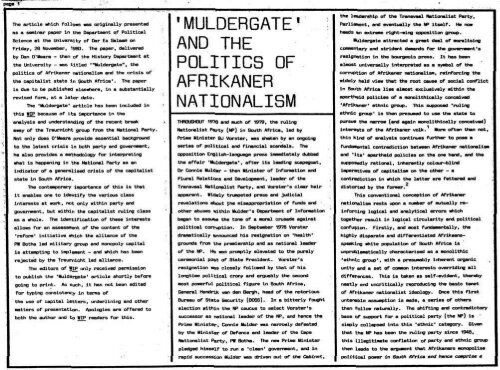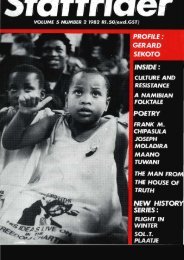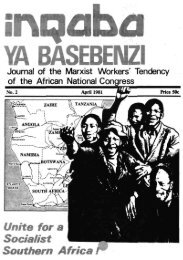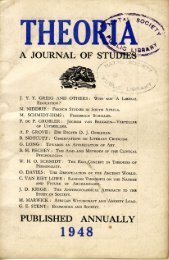Create successful ePaper yourself
Turn your PDF publications into a flip-book with our unique Google optimized e-Paper software.
pegs 1<br />
The article which follows was originally presented<br />
as e seminar paper in tha Paper taant of Political<br />
Science «t tha University of Oar £m Saloon on<br />
Friday, 26 November, 1960. The paper, delivered<br />
by Dan O'Meera - than of the History Department at<br />
tha University - was titled '"Muldergata". the<br />
politics of Afrikaner nationalise end the crisis of<br />
the capitalist state In South Africa'. The paper<br />
is due to be published elsewhere, in s substantially<br />
revised form, at a later date.<br />
The 'Muldergate' article has been included In<br />
this MP because of its importance in the<br />
analysis end understanding of tha recent break<br />
assy of the Treurnicht group from the National Party<br />
Not only does O'Maara provide essential background<br />
to the latest crisis in both party end government„<br />
he also provides a aathodology for interpreting<br />
ehat is happening in the National Party as an<br />
Indicator of a generalised crisis of the capitalist<br />
state in South Africa.<br />
The contemporary importance of this Is that<br />
it enables one to identify the various class<br />
interests et work, not only within party and<br />
governaent, but within the capitalist ruling class<br />
aa a whole- The identification of theee interests<br />
allows for en assessment of the content of the<br />
'reform* Initiative which the alliance of tha<br />
PM Botha led military group end monopoly capital<br />
is attaaptlng to implement - and ehlch has bean<br />
rejected by tha Trwumicht led alliance*<br />
The editors of f^P only received permission<br />
to publish the 'Muldergate* article shortly before<br />
going to print. As such. It has not been edited<br />
for typing consistenQy in tares of<br />
the use of capital letters, underlining and other<br />
eatters of presentetion. Apologies ere offered to<br />
both the author and to VIP readers for this.<br />
•MULDERGATE'<br />
AND THE<br />
POLITICS OF<br />
AFRIKANER<br />
NATIONALISM<br />
ThTOUGHOUT 1976 and much of 1979, the ruling<br />
Nationalist Party (NP) In South Africa, led by<br />
Prima Minister BJ Vorster, was shaken by en ongoing<br />
aeries of political and financial scandals. The<br />
opposition Engiiah-language press immediately oubbed<br />
the effalr 'Muldergate*f after its leading scapegoat,<br />
Or Connie Mulder - then Minister of Information and<br />
Plural Relations and Development, leader of the<br />
Transvaal Nationalist Party, and Vorster's clear heir<br />
apparent. WlQely trumpeted press end Judicial<br />
revelations about fhe misappropriation of funds and<br />
other abuses elthln Mulder's Department of Information<br />
began to siauaaj tha tone of e moral cruaada against<br />
political corruption. In September 1976 Vorster<br />
dramatically announced his resignation on 'health'<br />
grounds from the premiership and as national leader<br />
of the NP. He was promptly elevated to the purely<br />
ceremonial post of State rVesldent. vorster**<br />
resignation m%& closely followed by that of his<br />
longtime political crony and arguably the second<br />
most powerful polltlcel figure In South Africa,<br />
General Handrlk van den Bergh, head of the notorious<br />
Bureau of State Security (BOSS)* In e bitterly fought<br />
election within the NP caucus to select Vorster's<br />
successor as national leader of tha NP, and hence the<br />
Prima Minister, Connie Mulder was narrowly defeated<br />
by the Minister of Defence and leader of tha Cape<br />
Nationalist Party, PW Botha. Tha nee Prime Minister<br />
plsdged himself to run a 'clean' povernmmnt, and In<br />
rapid succession Mulder was driven out of the Cabinet ,<br />
the leadership of the Transvaal Nationalist Party*<br />
Parliament, and eventuelly tha NP itself. Ha now<br />
heads en extreaa right-wing opposition group.<br />
Muldergate attracted a greet dwal of moralising<br />
coeaejntary and etrtdent demands for the government's<br />
resignation In the bourgeois press. It has bean<br />
almost universally interpreted es e symbol of We<br />
corruption of Afrikaner rationalism, reinforcing the<br />
wldmly held view that tha root causa of social conflict<br />
In South Africa lies almost exclusively within tha<br />
apartheid policies of a monolithicelly conceived<br />
'Afrikaner* ethnic group. This supposed 'ruling<br />
ethnic group* is than presumed to use the etate to<br />
pursue tha narrow (and egjeln mcnolithicaOly conceived)<br />
interests of the Afrikaner volk. 1 Mora often then not,<br />
this kind of analysis continues further to poeo a<br />
fundamental contradiction between Afrikaner nationalism<br />
and 'its* apartheid policies on the one hand, and the<br />
supposedly ratlonel, inherently colour-blind<br />
Imperatives of capitalism on the other - e<br />
contradiction In which the latter are fettered and<br />
distorted by the former, 2<br />
This conventional conception of Afrikaner<br />
nationalism rests upon a number of mutually re<br />
inforcing logical and analytical errors ehlch<br />
togathar result in logical circularity and political<br />
confusion. Firstly, and aoat fundamentally, the<br />
highly disparate and dlfferentieted Afrikaans*<br />
speaking ahlta population of South Africa is<br />
unpi-oblematlcally charactarieed as a monolithic<br />
•ethnic group', with a presumably inherent organic<br />
unity and a set of common interests overriding all<br />
dlfferances. This is taken as self-evident, thereby<br />
neatly and uncritically reproducing the basic tenet<br />
of Afrikaner nationalist Ideology. Once this first<br />
untenable assumption is made, a seriea of others<br />
then follow naturally. The shifting and contradictory<br />
base of support for a political party (the NP) la<br />
simply collapsed Into this 'ethnic* category. Given<br />
that the NP has been the ruling party since 1908,<br />
this Illegitimate confletlon of perty and ethnic group<br />
then loads to the argument that Afrikaners monopolise<br />
polltlcel power in South Africa and hence comprise a

















